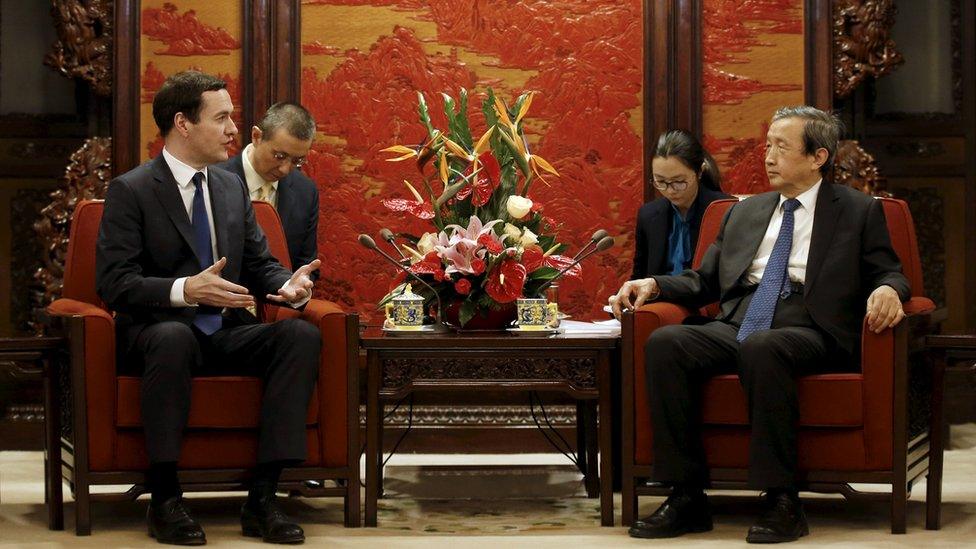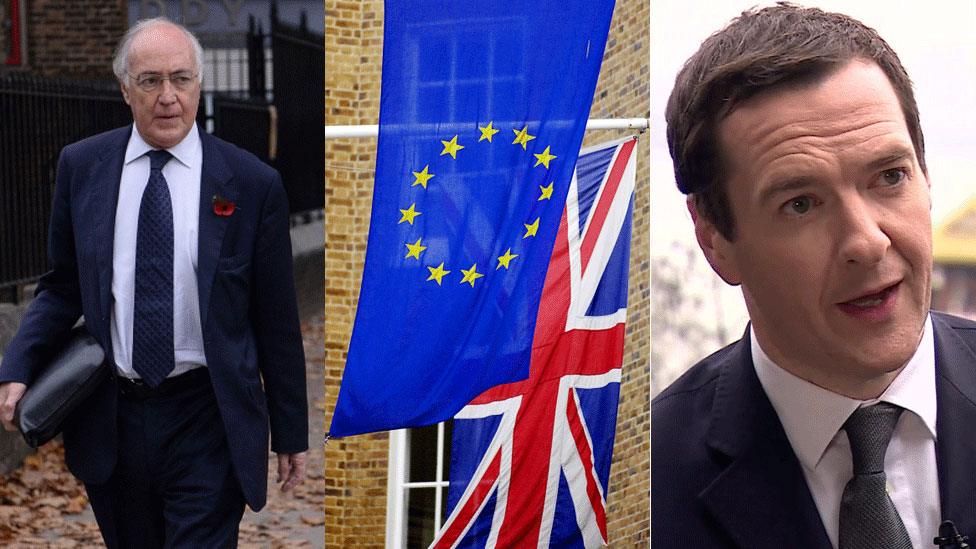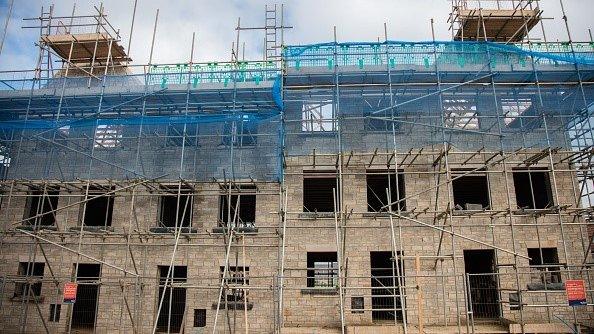George Osborne warns of further spending cuts in Budget
- Published
George Osborne: "We may need to undertake further reductions"
Chancellor George Osborne has warned he may have to make fresh cuts to public spending in next month's Budget.
Mr Osborne told the BBC global economic turmoil and slower growth meant "we may need to undertake further reductions".
He slowed the pace of cuts in the last spending review, but suggested savings could be announced in his 16 March Budget statement as figures showed the UK economy was smaller than expected.
Labour's John McDonnell said it was "a total humiliation" for Mr Osborne.
'Rainy day'
Speaking exclusively to BBC political editor Laura Kuenssberg during a visit to China, Mr Osborne said he would rather look for extra cuts now than risk breaking his own manifesto commitment to achieve a surplus in the budget by the end of this Parliament, in 2020.
The chancellor did not completely rule out raising taxes in the event of a further slowdown in growth, but said now was not the time for "significant" tax hikes.
He would not spell out the details of any further cuts, but said the Conservatives would stick to their manifesto pledge to protect some government departments.
It is understood he would not look to increase the level of cuts dramatically but would initially seek to make further efficiencies in government departments.
Mr Osborne said he wanted to "root our country in the principle that we live within our means" and would address this in the Budget.
Explaining why he was planning to make further savings, the chancellor said the global economy had got "markedly worse", the UK's economy needed to be more productive, and information from the Office for National Statistics showed it was also smaller than expected.
He said: "Because of all of those things, we have to respond to those events.
"So that's what our plan is rooted in and it may require further reductions in spending.
"I'll address that in the Budget but people should know this of me: I will do what is required to keep our country safe and secure."
He went on to say the "whole purpose of our economic plan was to have a budget surplus".

Analysis

George Osborne is in China, where he held talks with Chinese vice premier Ma Kai
By Laura Kuenssberg, BBC political editor
The chancellor wants to keep to his self-imposed rule of getting the books into surplus by the end of the Parliament. He could relax that rule and slow down the pace of the cuts but that's not what appears to be on his agenda.
Instead, it seems he'd rather find the money somewhere.
He wouldn't say where he'd look for cuts, but you can assume departments ministers have already pledged to protect will be safe from further austerity.
That of course means potentially tighter squeezes elsewhere.

Decisions about the level of potential future cuts will only be made once he receives the official assessments from the Office for Budget Responsibility, he added.
The extra cuts would be likely to be made towards the end of the Parliament, before 2020.
In his November statement, Mr Osborne watered down planned £4.4bn cuts to tax credits and eased back on planned spending cuts to the Home Office and other departments.
He was able to do this due to a combination of better tax receipts and lower interest payments on debt.
BBC economics editor Kamal Ahmed said that by 2020 Mr Osborne would be thinking about potentially being prime minister and leading the Conservatives into the next general election.
Mr Osborne believed having a surplus would show voters the Conservatives had "fixed the economy", he added.
'Built on sand'
Labour's shadow chancellor, John McDonnell, said the British people would end up paying for Mr Osborne's own failures.
He accused the chancellor of having "sneaked off to China to admit what Labour have been saying for months - that his recovery is built on sand".
"Far from paying our way, Osborne's short-term economics means Britain is deeper and deeper in hock to the rest of the world," he said.
"If the bankers' chancellor had been doing his job properly he would be collecting taxes from Google and other tax-dodgers.
"Instead he is threatening the British people with paying an even higher price for his own failures."
- Published26 February 2016

- Published28 January 2016
